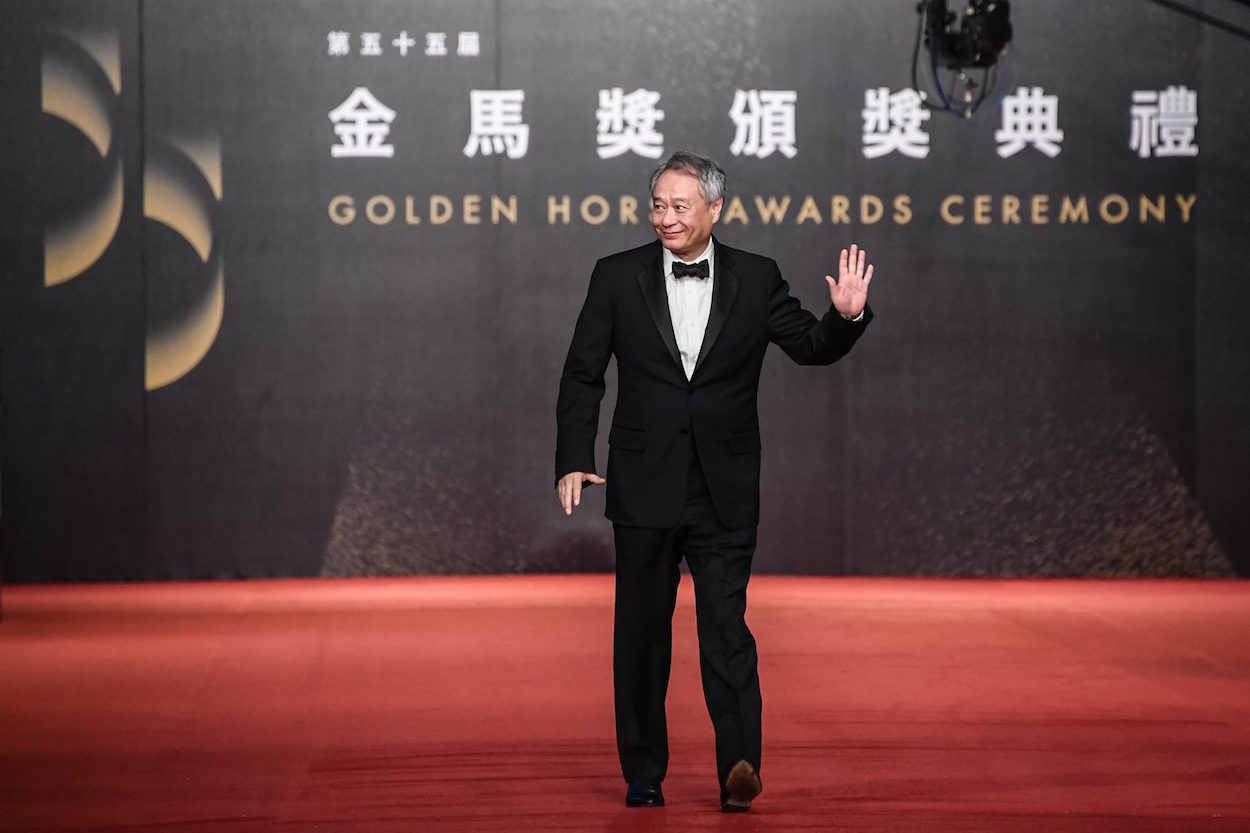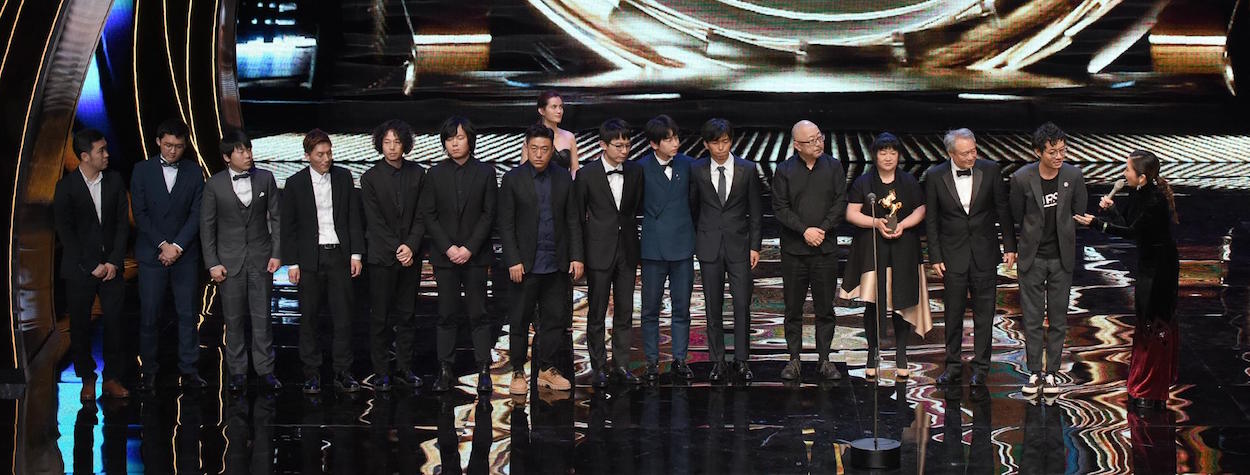by Brian Hioe
語言:
English
Photo Credit: Golden Horse Awards/Facebook
THE CHINA FILM Administration announced yesterday that it was banning participation by members of the Chinese film industry in this year’s Golden Horse Awards. As such, Chinese actors, directors, and other film production members will not be in attendance at the 56th Golden Horse Awards, which will be held in Taipei on November 23rd.
The Golden Horse Awards is an unusual institution, insofar as it is the flagship award ceremony of Sinophone film production, but the award ceremony takes place in Taiwan rather than China. The Golden Horse Awards was originally founded by the Republic of China Government Information Office in 1962. The four major award ceremonies of the Sinophone film industry are the Golden Horse Awards, the Golden Rooster Awards, the Hong Kong Film Awards, and Hundred Flower Awards.
 Director Ang Lee, the chair of the Golden Horse Awards jury last year. Photo credit: Golden Horse Awards/Facebook
Director Ang Lee, the chair of the Golden Horse Awards jury last year. Photo credit: Golden Horse Awards/Facebook
That the Golden Horse Awards continues to remain prominent in Sinophone film, despite that the Taiwanese film industry has long since been surpassed in size and scale by the Chinese film industry, may reflect the earlier development of the Taiwanese film industry. As with patterns of Chinese economic development writ large, it was not until in the past few decades that the Chinese film industry surpassed the Taiwanese or Hong Kong film industries in size.
It was anticipated beforehand that members of the Chinese film industry might be banned from participating in the Golden Horse Awards going forward after an incident last year in which documentary film director Fu Yue gave a speech stating that she hoped to see Taiwan recognized as an “independent entity” one day. Fu won “Best Documentary” for her film, Our Youth in Taiwan. [Full disclosure: The author appears briefly in Our Youth in Taiwan.] Although Fu’s phrasing did not actually explicitly vow support for Taiwanese independence, it was generally perceived as such, given that her documentary was about participants in the 2014 Sunflower Movement, including student leader Chen Wei-ting and Chinese student Tsai Bo-yi.
Immediately after Fu’s speech, the MC, Chinese actor Tu Men, declared that Taiwan was a part of China and that both sides of the Taiwan Straits were one family. Many Chinese participants in the award ceremony left Taiwan immediately after the award ceremony, without attending the afterparty. Non-Chinese attendees of the award ceremony have reported seeing texts circulating among Chinese participants warning them to leave immediately, with the possibility that they could see reprisals from the government or nationalistic netizens if they did not.
Subsequently, a controversy broke out regarding Fu Yue’s actions, with some accusing Fu of having perhaps “ruined” the Golden Horse Award ceremonies for Taiwan forever, while others—including Sunflower Movement student leader Lin Fei-fan—praised her actions as taking a stand for Taiwan on the international stage. President Tsai Ing-wen also issued a statement that Taiwan was not “Taiwan, China” and that it was an open and democratic society in the aftermath of the incident.
Video of Fu Yue’s speech after being awarded best documentary film for Our Youth in Taiwan. Film credit: friDay影音
More generally speaking, it has long been an issue in for members of Taiwan’s entertainment industry that—as with Taiwanese businesses that operate in China—they face the pressure to self-censor in order to avoid being shut out of the Chinese market, which dwarfs Taiwan. A recent example would be with Taiwanese bubble tea chain Yifang, whose Hong Kong franchisee caused controversy earlier this week after disavowing the current set of protests in Hong Kong against an extradition bill to be signed with China.
Reports by the Apple Daily last year that Chinese companies would subsequently be banned from participating in the Golden Horse Awards have now been proven true. Nonetheless, one generally suspects that some controversy would have eventually erupted regarding the Golden Horse Awards and its relation to China at some point, anyway, seeing as the award ceremonies are widely seen as the most prestigious Sinophone film award—yet, as reflecting larger tensions in Sinophone culture production, are not directly under the management of the Chinese government, nor is the awards based out of China.
With the Chinese film industry banned from participating in the Golden Horse Awards, it is clear that the Chinese government intends to try and redirect international attention to the Golden Rooster Awards, which will be held the same day as the Golden Horse Awards, and which also allow submissions from Sinophone countries and territories as Hong Kong and Taiwan. Obviously, to begin with, it would not have been possible for individuals to attend both sets of award ceremonies at the same time, but the ban on Chinese attendance in the Golden Horse Awards serves to guarantee that members of the Chinese film industry will be in attendance at the Golden Rooster, rather than Golden Horse Awards.
It is quite likely that the Chinese government will eventually be successful in making a set of award ceremonies under its control more prestigious than the Golden Horse Awards, particularly given the superior resources at China’s disposal and the larger Chinese film industry. The Golden Horse Awards likely did foreground Taiwanese film compared to other Sinophone film due to taking place in Taiwan and having many Taiwanese judges. In this way, the Golden Horse Awards was useful for Taiwanese soft power internationally—something China would have eventually wanted to take away, as also can be seen with efforts by the Chinese government to deprive Taiwan of the opportunity to hold international sporting events, as the East Asian Youth Games or the Asian Open Figure Skating Classic.
 Photo credit: Golden Horse Awards/Facebook
Photo credit: Golden Horse Awards/Facebook
As observed with the immediate withdrawal of members of the Chinese film industry during last year’s Golden Horse Awards following Fu’s speech, this would be another case of China weaponizing its own citizens. In effect, the Chinese government has taken them hostage in the services of conducting aggressive foreign policy against Taiwan.
Such actions from the Chinese government do not surprise. Indeed, it is to be noted that the Chinese government chose to directly impose a ban as a sign of force against Taiwan rather than, say, seeking to encourage nationalistic citizens to organize a boycott of the Golden Horse Awards on their own. Along with other Chinese government actions directed against Taiwan in past weeks, such as banning individual Chinese tourist visits to Taiwan, the Chinese government clearly intends to suggest that Taiwan’s domestic industries are at its mercy through its ban on the Golden Horse Awards.

